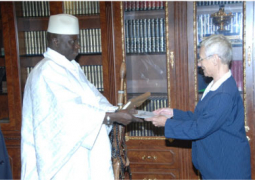People across the world are today November 16th marking International Tolerance Day. The day came at a time when politicians in The Gambia are canvassing for votes.
This makes this day very important for us to use in nurturing tolerance, especially political tolerance.
By doing so, we will learn to accommodate criticism, and allow all presidential hopefuls to campaign freely across the country.
The day is meant to generate public awareness, emphasize the dangers of intolerance and act with renewed commitment and action in support of tolerance, promotion and education.
According to the UN Declaration of Principles on Tolerance, tolerance is respect, acceptance and appreciation of the rich diversity of our world’s cultures, our forms of expression and ways of being human.
It is fostered by knowledge, openness, communication, and freedom of thought, conscience and belief.
The declaration emphasizes that tolerance is not only a moral duty; it is also a political and legal requirement.
Tolerance, the virtue that makes peace possible, contributes to the replacement of the culture of war by a culture of peace.
It went further to state that tolerance is not concession, condescension or indulgence.
Tolerance is, above all, an active attitude prompted by recognition of the universal human rights and fundamental freedoms of others.
In no circumstance can it be used to justify infringements of these fundamental values.
Tolerance is to be exercised by individuals, groups and states.
Tolerance is the responsibility that upholds human rights, pluralism (including cultural pluralism), democracy and the rule of law.
It involves the rejection of dogmatism and absolutism, and affirms the standards set out in international human rights instruments.
Consistent with respect for human rights, the practice of tolerance does not mean toleration of social injustice or the abandonment or weakening of one’s convictions.
It means that one is free to adhere to one’s own convictions and accept that others adhere to theirs.
It means accepting the fact that human beings, naturally diverse in their appearances, situations, speeches, behaviours and values, have the right to live in peace and to be as they are.
It also means that one’s views are not to be imposed on others.
While we mark this very important day, we urge all Gambians and non-Gambians alike living in the country to continue to be tolerant and peace-loving.





